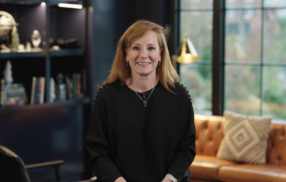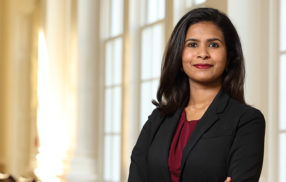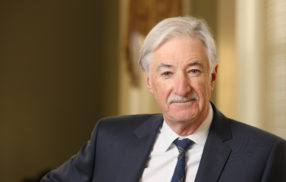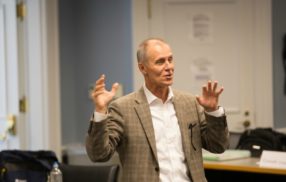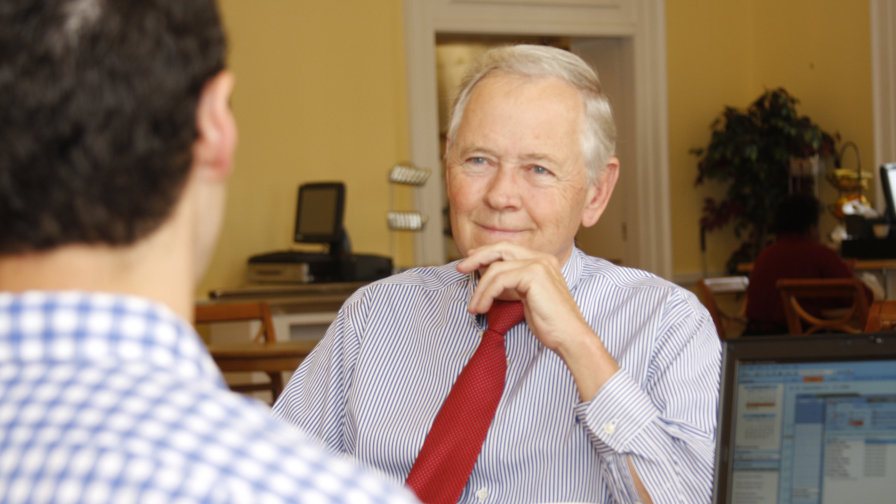
Robert Landel Set to Retire From UVA Darden After Nearly 50 Years
By Dave Hendrick
The start of University of Virginia Darden School of Business Professor Robert Landel’s journey of nearly 50 years at the School began with a research project at Georgia Tech, where Landel was completing a Ph.D. in industrial engineering.
Tasked by the department chair with interviewing faculty candidates who had been recruited by Georgia Tech, Landel found himself interviewing a young Darden professor named John Colley, and the pair of operations experts built an acquaintance. Before long, the man asking faculty about positions at Georgia Tech was instead being courted for a job at Darden.
“I had accepted a job to go back to Westinghouse,” said Landel. “The idea of teaching was not anywhere in my mind. But I came up here and interviewed and was thrilled with the opportunity, once it came to me.”
Landel would join Darden’s first generation of faculty, a cohort populated with the Harvard professors who, along with Dean Charles Abbott, were key leaders and major contributors to the School’s formation and growth since 1955.
“To work with some of the founders when I didn’t have an MBA or a degree from HBS — that was a big change in culture and expectations,” said Landel.
The young operations professor quickly took to the classroom experience, crediting Colley and Professor William Sihler with honing his approach: Ask questions and facilitate, but let the students guide a sizeable portion of the classroom.
Landel recalled asking Colley for his file on a case the more junior professor was planning to teach, and Colley going to his filing cabinet and handing him the file containing only an unblemished copy of the case.
“I don’t take notes,” Colley told Landel. Instead, Colley advised him to read the case, trust the students have done the same and help them get to where they need to be. You can’t go in with a set list of questions or calculation as to where the discussion will go, Landel realized.
Almost from the beginning of his time at Darden, Landel taught in Darden Executive Education’s open and custom programs. His all-time favorite was The Executive Program (TEP), where for 35 years he and a cohort of faculty members would design and deliver the product to senior executives, and, upon completion, immediately set about working together to redesign and improve upon what they just completed.
Said Landel, “I used to say to my faculty colleagues in TEP, I’ll teach for nothing, because this is such a joyful experience for me.”
The opportunity to iterate within the curriculum across MBA and Executive Education formats year to year remained a satisfying aspect for the operations professor, who knows a thing or two about continuous improvement. While the First Year core curriculum continues to be acknowledged as “a crown jewel” of the Darden School, Landel also has played a role in innovations such as adding First Year electives, managing the international field projects course in the early 1990s, adding concentrations to the Second Year curriculum and expanding Executive Education custom programs, for instance.
“The opportunity to have these special endeavors — oftentimes set up by very wise deans and associate deans — are a lifeblood of the institution,” said Landel. “Those are huge leverage points for the growth and enjoyment of the faculty.”
Landel, who has taught a significant portion of the students who ever earned a Darden MBA, said he treated teaching and student interaction like a service business, staying focused on the educational promises, fully engaging in the classroom, and “going overboard with energy and enthusiasm” when the opportunity arose to work with students outside of classroom.
“People ask how do the faculty and staff create such loving and loyal alumni, and it’s that total engagement in a well-understood learning process,” Landel said. “Then, every five years the students come back to reunion as alums, and you go to those events and you keep adding to those relationships.”
The frequent touchpoints bond current and former students to the School, and strengthen the faculty connection to the product they help produce — the Darden MBA.
Landel offers a similar reason for the drive to write cases with students over the years. To help a student engage so fully with a field-based business issue that they become the published expert is “the most stimulating thing,” said Landel.
Looking ahead, Landel, who has long taught systems thinking in his Second Year elective, is helping to finish The Bay Game, a multiplayer simulation that challenges participants to investigate various system complexities and test solutions to socio-environmental problems — specifically, declining water quality in the Chesapeake Bay.
Landel, McIntire School of Commerce Professor Mark White and UVA Environmental Sciences Professor Dave Smith have been working for several years on the project, which will be published by Darden Business Publishing in 2019. Landel hopes to use a portion of his time in retirement encouraging institutions to use The Bay Game to build participants’ systems thinking and collaborative design skills.
When Landel reflects on his decision more than 50 years ago to spurn Westinghouse and become an unexpected academic, he has no doubt he made the right decision.
“The opportunity to be part of expanding on the core of the School, and to be involved in managing that growth, they were huge opportunities,” said Landel. “This is the ultimate heaven-on-earth experience with regard to career.”
The University of Virginia Darden School of Business prepares responsible global leaders through unparalleled transformational learning experiences. Darden’s graduate degree programs (MBA, MSBA and Ph.D.) and Executive Education & Lifelong Learning programs offered by the Darden School Foundation set the stage for a lifetime of career advancement and impact. Darden’s top-ranked faculty, renowned for teaching excellence, inspires and shapes modern business leadership worldwide through research, thought leadership and business publishing. Darden has Grounds in Charlottesville, Virginia, and the Washington, D.C., area and a global community that includes 18,000 alumni in 90 countries. Darden was established in 1955 at the University of Virginia, a top public university founded by Thomas Jefferson in 1819 in Charlottesville, Virginia.
Press Contact
Molly Mitchell
Senior Associate Director, Editorial and Media Relations
Darden School of Business
University of Virginia
MitchellM@darden.virginia.edu


